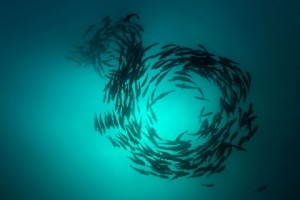
In the mid-1900s, an international effort to make protein-rich foods more available at lower costs pushed for growth in the fishing industry. Large, profit-seeking fleets answered the call and began aggressively fishing the oceans and freshwater sources worldwide. By 1989, the size of the catches hit their peak, and yields have declined ever since.
The decline is due to massive overfishing all over the globe, meaning more fish have been taken from the waters at a faster rate than they can reproduce. Overfishing has led to the collapse of some fisheries, including orange roughy, Chilean sea bass, and bluefin tuna. When such areas become completely depleted, some skeptics believe there is no going back—that limited fishing and marine reserves will make no difference. Others believe restricting fishing will hurt economies and lead to the loss of jobs.
But the marine reserve of Cabo Pulmo in the Gulf of California proves all those naysayers wrong.
In the 90s, the villagers of Cabo Pulmo, noticing the loss of fish, became resolute in their desire to turn the area into a “no-take zone,” thereby protecting the area from more fishing and reviving it to what it once was. Some looked at the area empty of fish and thought the revival was a noble idea, but not one thought it would amount to much. The 71 square-kilometer Cabo Pulmo National Marine Park sits close to where the Gulf opens into the Pacific, and in 1995 it was granted protection under the government of Mexico, despite much skepticism. Although fishing is banned in only 35% of the park, dedicated villagers unofficially banned fishing along their entire coast, protecting the entire park area.
Today, the park is teaming with life. The results of a 10-year study published in the Public Library of Science (PLoS) ONE journal found the total number of fish in the reserve has increased by over 460%! Even the numbers of large fish, such as sharks, which take longer to mature and reproduce, have increased. The study found that even completely depleted sites can recover to levels of pristine, never-fished sites. The reserve now even holds economic benefits through successful eco-tourism ventures, becoming a viable source of income for local communities.
One co-author of the study, Exequiel Ezcurra, stated:
“If you visit the place now, you cannot believe the change that has taken place. And all of it has occurred thanks to the determination of a community of coastal villagers that decided to take care of their place and to be at the helm of their own destiny.”

Early on, in 2002 and 2003, Global Greengrants Fund supported two organizations, Cabo Pulmo Conservation Network and Amigos para la Conservación de Cabo Pulmo, A.C. in getting this work going. The communities’ hard work has proven extremely successful, but more work remains.
Earlier this year, a large tourist development project was announced to be built nearby, which would threaten the marine reserve. The Cabo Pulmo communities are once again rallying together to protect the reserve and the biodiversity it holds.
Please consider making a donation today to support marine conservation efforts like these around the world.

